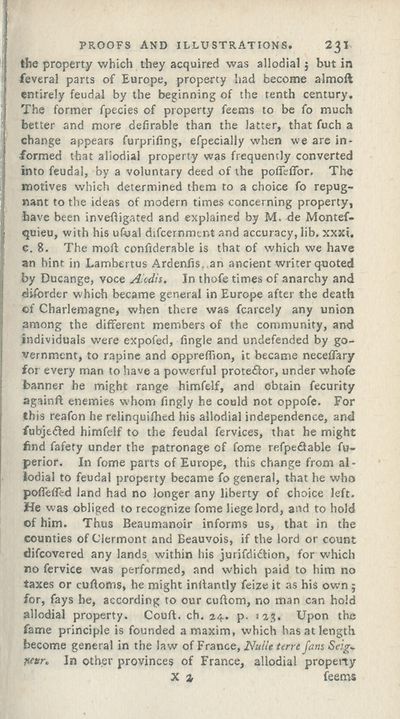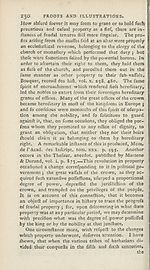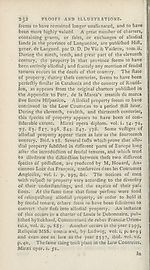Download files
Complete book:
Individual page:
Thumbnail gallery: Grid view | List view

PROOFS and illustrations. 231
the property which they acquired was allodial ; but in
feveral parts of Europe, property had become almoft
entirely feudal by the beginning of the tenth century.
The former fpecies of property feems to be fo much
better and more defirable than the latter, that fuch a
change appears furprifing, efpecially when we are in¬
formed that allodial property was frequently converted
into feudal, by a voluntary deed of the pofleflbr. The
motives which determined them to a choice fo repug¬
nant to the ideas of modern times concerning property,
I have been inveftigated and explained by M. de Montef-
quieu, with his ufual difcernment and accuracy, lib. xxxi.
c. 8. The moft confiderable is that of which we have
an hint in Lambertus Ardenfis. an ancient writer quoted
by Ducange, voce A.odis. In thofe times of anarchy and
eiforder which became general in Europe after the death
of Charlemagne, when there was fcarcely any union
among the different members of the community, and
individuals were expofed, fmgle and undefended by go¬
vernment, to rapine and oppreffion, it became neceflary
for every man to have a powerful proteftor, under whofe
banner he might range himfelf, and obtain fecurity
againft enemies whom fingly he could not oppofe. For
this reafon he relinquifhed his allodial independence, and
fubje&ed himfelf to the feudal fervices, that he might
find fafety under the patronage of feme refpeQable fu-
perior. In fome parts of Europe, this change from al¬
lodial to feudal property became fo general, that he who
pofTeffed land had no longer any liberty of choice left.
He was obliged to recognize fome liege lord, and to hold
of him. Thus Beaumanoir informs us, that in the
counties of Clermont and Eeauvois, if the lord or count
difeovered any lands within his jurifdidtion, for which
no fervice was performed, and which paid to him no
taxes or cuftoms, he might inftantly feize it as his own ;
for, fays he, according to our cuftom, no man can hold
allodial property. Court, ch. 24. p. 123. Upon the
fame principle is founded a maxim, which has at length
become general in the law of France, Nullc terre fans Si-’g-
iu*r. In other provinces of France, allodial property
x a feems
the property which they acquired was allodial ; but in
feveral parts of Europe, property had become almoft
entirely feudal by the beginning of the tenth century.
The former fpecies of property feems to be fo much
better and more defirable than the latter, that fuch a
change appears furprifing, efpecially when we are in¬
formed that allodial property was frequently converted
into feudal, by a voluntary deed of the pofleflbr. The
motives which determined them to a choice fo repug¬
nant to the ideas of modern times concerning property,
I have been inveftigated and explained by M. de Montef-
quieu, with his ufual difcernment and accuracy, lib. xxxi.
c. 8. The moft confiderable is that of which we have
an hint in Lambertus Ardenfis. an ancient writer quoted
by Ducange, voce A.odis. In thofe times of anarchy and
eiforder which became general in Europe after the death
of Charlemagne, when there was fcarcely any union
among the different members of the community, and
individuals were expofed, fmgle and undefended by go¬
vernment, to rapine and oppreffion, it became neceflary
for every man to have a powerful proteftor, under whofe
banner he might range himfelf, and obtain fecurity
againft enemies whom fingly he could not oppofe. For
this reafon he relinquifhed his allodial independence, and
fubje&ed himfelf to the feudal fervices, that he might
find fafety under the patronage of feme refpeQable fu-
perior. In fome parts of Europe, this change from al¬
lodial to feudal property became fo general, that he who
pofTeffed land had no longer any liberty of choice left.
He was obliged to recognize fome liege lord, and to hold
of him. Thus Beaumanoir informs us, that in the
counties of Clermont and Eeauvois, if the lord or count
difeovered any lands within his jurifdidtion, for which
no fervice was performed, and which paid to him no
taxes or cuftoms, he might inftantly feize it as his own ;
for, fays he, according to our cuftom, no man can hold
allodial property. Court, ch. 24. p. 123. Upon the
fame principle is founded a maxim, which has at length
become general in the law of France, Nullc terre fans Si-’g-
iu*r. In other provinces of France, allodial property
x a feems
Set display mode to:
![]() Universal Viewer |
Universal Viewer | ![]() Mirador |
Large image | Transcription
Mirador |
Large image | Transcription
| Antiquarian books of Scotland > Kings & rulers > History of the reign of the Emperor Charles V. > Volume 1 > (249) |
|---|
| Permanent URL | https://digital.nls.uk/109185319 |
|---|
| Description | By William Robertson. London : Cadell and Davies, 1798. |
|---|---|
| Shelfmark | ABS.1.76.13 |
| Additional NLS resources: | |
| Description | Thousands of printed books from the Antiquarian Books of Scotland collection which dates from 1641 to the 1980s. The collection consists of 14,800 books which were published in Scotland or have a Scottish connection, e.g. through the author, printer or owner. Subjects covered include sport, education, diseases, adventure, occupations, Jacobites, politics and religion. Among the 29 languages represented are English, Gaelic, Italian, French, Russian and Swedish. |
|---|

